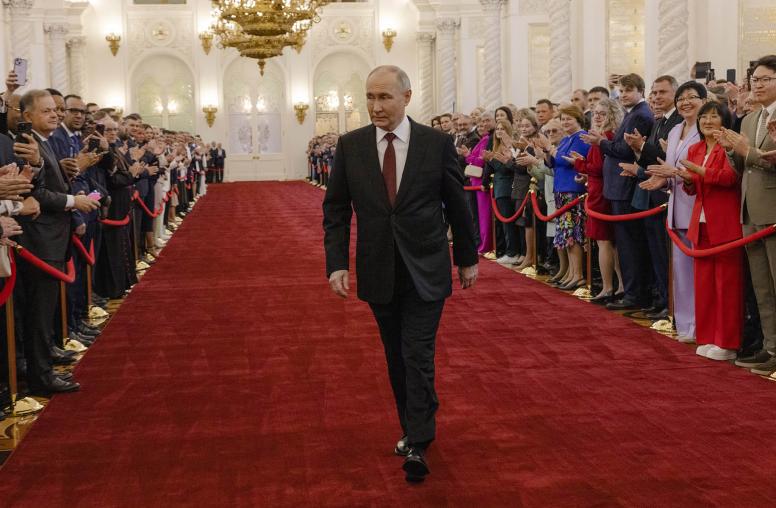The Ukrainian opposition’s strong organization through months of mostly peaceful public protests against the government of President Viktor Yanukovych, coupled with his failure to win the full support of business leaders and questions about the loyalty of the military, improves the prospects for a new deal to end the deadly violence of recent days, said USIP Vice President Bill Taylor.

As a former U.S. ambassador to Ukraine, Taylor has been called on to analyze the rapidly unfolding events in recent days for television news and other media. He told BBC News on Feb. 19 that the protesters who have mostly controlled Kiev’s Independence Square, known as the Maidan, since November are made up of a range of groups and interests, but had managed to organize an impressive movement. They had been “remarkably organized, remarkably disciplined” in pressing their case and taking care of the many thousands of demonstrators who kept the square occupied during the coldest months.
The outbreak of horrific violence this week that may have killed 100 people, by some estimates, makes it that much more difficult to resolve the longstanding disputes between the two sides, Taylor told the PBS NewsHour broadcast on Feb. 20. Still, it is not too late to try, he says.
Demonstrators with weapons “does damage the moral clarity” of the protesters, but it doesn’t obscure the fact that the government maintains the responsibility for the problem, the former ambassador said on CNBC Television’s Squawk Box program.
The foreign ministers of Poland, Germany and France held talks with both sides in Kiev on Feb. 20 and 21, and helped hammer out a compromise between the two sides that calls for early presidential elections and a curb of the president’s powers in the constitution. Opposition leaders were tasked with selling a deal to their supporters that doesn’t require Yanukovych’s ouster. Within hours, the parliament took action to implement the measures within its control, and also passed a bill that may free the jailed opposition leader Yulia Tymoshenko. European leaders also had called for her release since she was imprisoned in 2011.
“I welcome the tentative agreement reached early this morning, facilitated by European foreign ministers,” Taylor said today. “I urge that the Ukrainian government and opposition leaders work together to develop a genuine political dialogue to implement this agreement. Such a dialogue, which should result in power-sharing and a national unity government and early elections, offers the only viable path to avoid the risk of greater violence.”
The violence made it both harder for Yanukovych to negotiate and more important that he do so, said Taylor, who also has served as the State Department’s coordinator for Middle East Transitions, and currently serves as USIP’s vice president for the Middle East and Africa. A truce earlier this week fell apart overnight but hadn’t involved specific written terms, nor the on-the-ground involvement of the European foreign ministers.
Ukraine’s “oligarchs” “have been very cautious during this crisis and have made the same appeals as European leaders and U.S. President Barack Obama -- to stop the bloodshed, Taylor told the BBC. Many influential business leaders have indicated they would rather deal with Europeans, the European Union and western markets “rather than being under the control of, under the thumb of, or under the influence of the Russians,” said Taylor, who also has served as the State Department’s coordinator for Middle East Transitions.
The military, which has worked closely with the North Atlantic Treaty Organization (NATO) in recent years, also seems to be trying to resist getting involved in a domestic battle. Yanukovych’s Party of Regions also has suffered defections, including most recently Kiev’s top city administrator.
The protests began after Yanukovych backed away from an association agreement for Ukraine with the European Union. Russia followed the decision with an announcement of a $15 billion injection to help shore up Ukraine’s finances, a deal seen as a reward to Yanukovych for rejecting an alliance with the EU. Opposition complaints have since expanded to include the rampant corruption and injustices that beset daily life in Ukraine and restrictions on freedom viewed as undemocratic in a country where many see themselves as part of Europe.
Disputes over the country’s direction often have been reduced to divisions between the largely European-leaning west of the country and the more Russian-influenced east and south. The country became independent in 1991 with the breakup of the former Soviet Union, and has struggled with its internal political divisions and its economy ever since, including the 2004 Orange Revolution against a Russia-backed government. Ukraine’s size and location at the heart of Europe makes it an important trading partner for both the European Union and Russia, Taylor told the PBS NewsHour.
“The Ukrainians are the most important actors in this question, and they think of themselves as sovereign, and have for 22 years,” he told CNBC.
The European Union and the U.S. this week have considered or imposed various sanctions such as asset freezes and travel bans on government-aligned figures they consider responsible for the violence in hopes of spurring an accommodation.
“The Ukrainians have put up with a lot in their history. They’ve suffered a lot,” including at the hands the Russians and Soviets, Taylor told the BBC on Feb. 19. “The Ukrainian people are a generally – and genuinely – peaceful people who will look for a way to sit down together and work this out.”
Viola Gienger is a senior writer at USIP.



